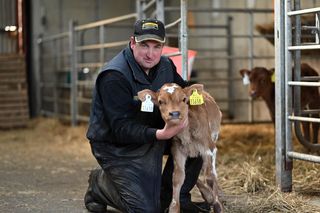'Any child I have will get the HPV vaccine' - Irish woman who was diagnosed with cervical cancer in her twenties
Heather Keating was in her 20s when she got cervical cancer. She tells Joy Orpen how she is warning other young women that they are not immune to the disease, and encouraging them to avail of free smear tests
Heather Keating encourages young women to avail of free smear tests. Photo: Dylan Vaughan
Even though there is controversy surrounding the vaccine to prevent cervical cancer, Heather Keating (26) is adamant that if she were offered it now, she would take it without a second's hesitation. The reason being, that even though she is so young, she has already survived the ravages of cervical cancer.
Getting sick was the last thing Heather anticipated while she was happily growing up in a rural setting near Cashel, Co Tipperary. After school, she enrolled in Templemore College of Further Education to do hairdressing. Eventually, she came to the realisation that hairdressing wasn't for her, so she went back to college, and two years later, she qualified as a veterinary assistant. She then got a temporary position with Mo Chara Animal Rescue, in nearby Thurles.
This was followed by a job with a chain of pet stores. Part of Heather's brief was to visit schools and youth centres as a pet-care advocate. Apart from her training as a veterinary nurse, Heather is well qualified to talk about pets, as she has a dog, a cat, a guinea pig and an aquarium at the home in Carlow she shares with Daniel, her partner for the past eight years.
However, the fabric of her somewhat idyllic lifestyle started to unravel just over a year ago, when Heather noticed she was bleeding between periods. At first, she wasn't too concerned. But when she began to bleed after being intimate, she went to the doctor and was referred to a gynaecologist. "It was a public appointment and took four months," Heather explains. "So I got on with my life. But over time, the bleeding got worse, and by the time I saw the gynaecologist at South Tipperary General Hospital, I was already anaemic. Having examined me, the consultant realised something was wrong and arranged for me to have a colposcopy the following week. During this procedure, my cervix was examined in more detail."
Following this investigation, Heather learned that a biopsy would have to be done. When she asked if she should be worried, she was told that many biopsies come back perfectly clear. So she was somewhat reassured. However, when Heather returned to the hospital four weeks later, she discovered that, unfortunately, the biopsy had been inconclusive, so she was referred on to St Finbarr's Hospital in Cork, where another colposcopy and biopsy were done.
Eventually, Heather, with her mother by her side, was seen by a consultant at Cork University Hospital (CUH). "Two words came out of his mouth; two words you never, ever want to hear," Heather recounts, her voice trembling. "'It's cancer'. Then silence. I looked at my mother, her eyes filling with tears. My heart broke; not for me, but for my family; that they would have to go through this journey with me. Or they would be left to suffer if the worst happened."
Further investigations, including an MRI scan, were undertaken to ascertain if the cancer had spread to any other part of Heather's body. If it had spread, surgery would not be advisable. Chemotherapy and radiation treatments would then be the only options; but they could in themselves threaten Heather's fertility. However, if the cancer was confined to the cervix, then a radical trachelectomy might be possible. During this procedure, the cervix and nearby tissue are removed, but the womb is left in place. Heather had to wait a week for the results of the scan. "That was the very worst week of my life," she says. "I was literally walking around in circles. I was shaking and I couldn't eat. Oddly, I was able to sleep for 12 to 14 hours a night. I think that was my body's way of coping." But finally, she got great news - the cancer hadn't spread. "I chose a radical trachelectomy in the hope of preserving my fertility," she explains.
Read more:
Four weeks later, in November 2015, she had the surgery. "It was done robotically," Heather explains. "As far as I know, the consultant wasn't even in the same room. He was next door, managing the robot, using monitors. During surgery, they removed my cervix, lymph nodes and some surrounding tissue to test the margins. There was very little pain during my recovery. Two weeks later, the results came back clear, so I didn't need chemotherapy or radiation. It was the most unbelievable relief." Nonetheless, Heather has check-ups every three months, so the specialist, whom she praises unreservedly, can keep a close medical eye on things.
The reason why Heather is talking about such a recent traumatic personal experience is to encourage other young women to go for free smear tests, which are available from the age of 25. "Cervical cancer is such a preventable disease," says Heather. "We now have a test to sound the alarm early, when the chances of recovery are high."
Her other motivation is to promote a vaccine which helps prevent the human papilloma virus (HPV), which can cause cervical cancer. There has been controversy surrounding this vaccine since it became available in 2010, to all girls, in their first year at secondary school in Ireland. A small number of those who were given the HPV vaccine, have reported that they now suffer from chronic-fatigue-type symptoms.
However, Dr Rob O'Connor, head of research at the Irish Cancer Society says, "The HPV vaccination programme is safe. HPV causes a number of cancers in men and women. For women, ongoing HPV infections can lead to cervical cancer. The HPV has also been linked to other forms of cancers in men and women, including cancers of the anus, throat, mouth, tongue, tonsil, vagina and penis."
Heather comments, "I've done a lot of research and I do believe the vaccination does prevent a lot of cancers. In Australia, they also give it to young boys, and since its introduction 10 years ago, the number of cancer cases has dropped."
As far as her future is concerned, Heather is positive. She is now working for the Dogs Trust as an education officer, and loves her job. "I take Ted, my education dog, to work with me," she says enthusiastically. As to having a family, she says: "I have eight nieces and nephews, and I love every one of them dearly. But Daniel and I can't wait to have children of our own. And any child I have will get the HPV vaccine."
Cervical Cancer Prevention week takes place from today, January 22. The Irish Cancer Society urges women between the ages of 25-60 to go to their GP for a free smear test. This is part of the CervicalCheck screening programme.
See cancer.ie/cervical or cervicalcheck.ie
Join the Irish Independent WhatsApp channel
Stay up to date with all the latest news














